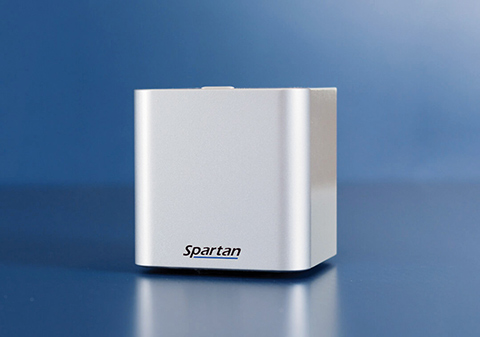In a world of instant outcomes, some things still take time. If you need a DNA test, you or your physician must send a sample to the lab and then wait for the results – sometimes several days or even weeks. Specimens are occasionally lost or mislabelled.
This kind of delay or mishap may soon be a thing of the past, though, thanks to a device developed by Spartan Bioscience, an Ottawa company founded by brothers John Lem (BASc 2005) and Paul Lem (BSc 1998) and Dr. Jamie Spiegelman (BSc 1999, MD 2005). They have commercialized a cube-shaped DNA-testing device about the size of a mug that has received approval from the U.S. Food and Drug Administration and from Health Canada. It can be operated with minimal training and fits almost anywhere, allowing pharmacies, doctor’s offices and other health-care organizations to conduct DNA testing cheaper and faster. Users simply do a cheek swab and insert it into the device, which generates results in less than an hour.
John Lem, the company’s vice-president of corporate development, says Spartan is marketing a handful of tests for the device, including one that screens for a genetic mutation associated with Alzheimer’s and another that can be used to test for the presence of legionella bacteria in the air-cooling systems of large commercial buildings. (Bacteria that get into these systems can trigger outbreaks of Legionnaires’ disease, a severe form of pneumonia.) To date, he notes, there’s been no good way to test quickly for legionella in these systems. The cube allows tests to be conducted on a regular basis so property managers can ensure consistently safe buildings.
The most ambitious application, however, involves using the device to identify individuals who may not know they are resistant to certain life-saving drugs. Clopidogrel (also known as Plavix), for example, is the mostly commonly prescribed blood thinner for people who have had a stroke or heart attack. But about 30 to 40 per cent of the population has a genetic mutation that renders clopidogrel ineffective for preventing clots.
The cube allows emergency physicians to test patients quickly and then prescribe one of two alternatives to clopidogrel if warranted. Researchers in the U.S., Canada and South Korea, working in collaboration with the Mayo Clinic, are testing the cubes on 5,000 patients to investigate how they improve outcomes for patients who have suffered a stroke or cardiac arrest. Such applications, John says, represent a step toward personalized medicine, but also hold out potential for bringing more precise, inexpensive and timely care to people living in low-income regions of the world with little access to lab testing.
For now, Spartan sells the cubes for between $5,000 and $10,000, but hopes to eventually sell testing cartridges instead of the device itself. “Our goal,” John says, “is to give them away for free.”
Recent Posts
A Sentinel for Global Health
AI is promising a better – and faster – way to monitor the world for emerging medical threats
The Age of Deception
AI is generating a disinformation arms race. The window to stop it may be closing
Safety First
AI has developed faster than anyone thought. Will it serve humanity’s best interests?




